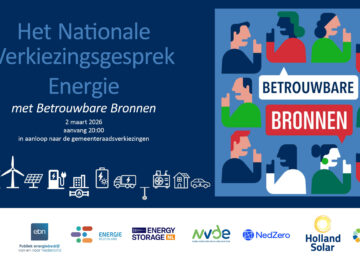We can make the Netherlands more independent with more solar and wind power and energy storage
The need to generate more renewable energy on land is undiminished. Solar and wind energy help against power rush hour and make us more independent from expensive and unpredictable imports. The Dutch Renewable Energy Association (NVDE), Energie-Nederland, NedZero, Holland Solar and Energy Storage NL say they can realize much more solar and wind energy than they are given space for. If it were up to them, the administratively agreed RES ambition of 55 TWh in 2030 would be feasible. 'Clean energy from your own region is often the key through which companies and new districts can move forward,' says Olof van der Gaag, chairman NVDE. 'It is good if this realization permeates RES regions more and more.'
The organizations call attention to the prospects that decentralized generation, in combination with storage, can offer in the event of off-take congestion. In more and more places, companies that want to increase sustainability, expand or relocate are faced with waiting lists for grid connections. Recent research by Eqolibrium shows that demand congestion is almost always technically solvable, but rules, spatial limitations and political choices stand in the way. This can and should be done differently.
Energy transition is now about more than realizing megawatts. Is electricity being generated where the energy system demands it? The organizations see that space is not always created for extra generation and storage where it is badly needed. The needs of the energy system are often not given sufficient weight in (spatial) considerations.
In that context, the growing imbalance in the realization of solar and wind energy projects is a missed opportunity. Wind energy threatens to lag further behind, while it complements solar power beautifully: when the sun is not shining, there is often wind, and vice versa.
Decentralized generation and storage can also allow new housing developments to be connected to the grid more quickly, where they are currently often delayed by the full power grid. These opportunities deserve more emphasis from policymakers, in addition to dominant frames such as nuisance and space consumption.
The renewable energy organizations also see great opportunities for the further rollout of solar and wind energy and energy storage toward 2050, as laid out in the National Energy System Plan. The RES regions are indispensable to create the space for this.





